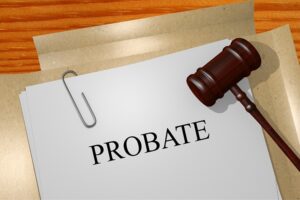If the deceased leaves an unclear will, there can be a lot of confusion and chaos. This will eventually lead to misunderstandings and frustrations among the loved ones. Who can be named as an estate beneficiary? If you are an heir, are you automatically a beneficiary? If a deceased left a will with nominated one or multiple beneficiaries, will it still go through a probate process? What information can you receive if you have been named beneficiary of a will? And what rights do you have? These are questions that our lawyers face every day.
If you want to learn more about beneficiaries, continue reading to familiarize yourself with the process.
Define Estate
An estate is everything comprising all the assets of a deceased person. This can include financial accounts, brokerage accounts, real and personal property, vehicles, land and real estate, investments, financial securities, retirement accounts, life insurace policy, jewelry, household furnishings, and other assets the decedent owned.
What Is an Estate Beneficiary?
An estate beneficiary is a person or organization that will receive a portion or the whole inheritance from the estate after a person’s death.
In terms of the estate law, there are two terms you may have heard to describe these people: “heirs” and “beneficiaries.”
Both terms refer to the people who may inherit something from the estate when you pass away — and many people use “heir” and “beneficiary” interchangeably. But while they are similar, there are significant legal differences between the two words:
- Heir—someone who would be legally entitled to inherit from the deceased under Georgia law if the decedent passed away without leaving a will (died intestate). In other words, an heir is the beneficiary of an estate without a will. The heirs are people related to the late person by blood or marriage, like the decedent’s surviving spouse or children.
- Beneficiary—is a person named in a will or trust to receive specific assets after someone dies. Unlike an heir, a beneficiary doesn’t need to be related to the deceased, and the late person can designate one or more estate beneficiaries. An estate beneficiary example can be anyone the decedent chooses – a friend, a colleague, or even a charitable organization.
On short,
- if the deceased had a will, then the will should name the beneficiaries of the decedent’s estate.
- if the deceased did not have a will, then the deceased’s heirs will be the beneficiaries per the intestate laws of Georgia.
If someone names beneficiaries in their will, their legal rights to claim the decedent’s assets outrank the heirs’ rights.
Why are beneficiaries important?
Beneficiary designation in a will is important because it specifies who the deceased wanted to receive their estate. Also, the late person can be confident that those to whom he’s decided to give the inheritance are assumed to receive it.
Besides, having beneficiaries simplifies settling the deceased’s estate and can reduce the potential for stressful situations for the surviving relatives.
If someone does not leave a will with designated beneficiaries, the estate will be distributed per intestate state law, which may differ from what the deceased truly wanted.
Examples of beneficiaries
A person can name a beneficiary for almost anything related to his money or property. Here are some examples:
- designated beneficiary in a will.
- designated beneficiary of a non-probate asset, as they are exempt from probate and will go directly to an individual.
In the category of non-probate assets can be included:
- POD – Payable on Death Accounts.
- Certificates of Deposit.
- Bank Accounts that have a POD (Payable on Death) or TOD (Transfer on Death) listed on the account.
- IRA, 401K with a designated beneficiary, Payable on Death or Transfer on Death on the account.
- Real estate or land titled with other parties as Joint Tenants with Rights of Survivorship or real estate with joint ownership.
Types of Estate Beneficiaries
There are two types of beneficiaries: primary beneficiary and contingent beneficiary.
A primary beneficiary is the first individual the deceased has chosen to receive the specified asset. While other beneficiaries also may be listed in estate documents, this person or organization will receive all the estate assets.
Contingent beneficiaries are the second beneficiaries. They are the individuals that the deceased has chosen to receive the specified asset if the primary beneficiary passes away or cannot be located. You can name more than one secondary beneficiary and decide how the assets would be divided between them.
What is a residuary beneficiary?
The beneficiary that the deceased had specified in their will to receive the residual estate.
The residual estate includes any assets the deceased owned but was not specifically mentioned in the will.
Who Can Be the Estate Beneficiary In Probate?
- Immediate family members.
- Minor children.
- Special needs and other lifelong dependents.
- Charities.
- Companies.
When choosing beneficiaries, the deceased could also designate any friends, neighbors, or anyone they wish to receive the estate as their beneficiaries in their will.
What Are the Rights of Beneficiaries During Probate in Georgia?

As an estate beneficiary in Georgia, you are an interested party to the estate and have several estate beneficiary rights. At the most basic level, you are entitled to:
- Be notified when an estate has been opened.
- Receive information about the estate and its administration in a timely manner. This includes a detailed list of the decedent’s property and assets, an accounting of debts and liabilities, and a timeline for when distributions will be made.
- Obtain an accounting of the estate’s assets, debts, and distributions. This means you can request a detailed report of all financial transactions within the estate.
- Request information regarding the estate’s assets and liabilities from the executor. When the executor resists and doesn’t fulfill his fiduciary duty, the most common way to find out this information is to request an accounting or inventory of the estate.
- Contest the will. If you believe the will is fraudulent or isn’t the most recent version, you have the right to contest it in court, according to your inheritance rights. As this can be a complex process, we strongly recommend you consult a specialized attorney before proceeding.
- Receive your inheritance. As an estate beneficiary, you have the right to receive the assets left to you in the will as long as the estate has enough assets to cover any debts.
- Fair treatment. You have the right to be treated fairly by the executor because he must act in the best interests of the beneficiaries and the estate. If they violate this, they can be held legally responsible.
- Legal action. If you consider that the executor is not fulfilling his duties in good faith, you have the right to take legal action. This could include asking them to be replaced, or you can seek compensation for any losses caused by their actions.
These are just a few examples of the rights of beneficiaries during probate in Georgia, there may be other rights that are not listed here.
Who Contacts Beneficiaries of a Will?
In Georgia, once the probate court has appointed the executor, the personal representative is required to send notice to the will’s beneficiaries to notify them that:
- they are designated as beneficiaries in the will.
- the estate has been opened in probate court.
- the court has appointed a personal representative.
What Information Is a Beneficiary of a Will Entitled to?
Once the estate is opened and an executor is appointed, beneficiaries can request information regarding the estate’s assets and liabilities from the executor.
Beneficiaries are interested parties to the estate and have the right to know what is coming into and going out of it. They can also inquire about the estate’s progress and the estimated timeline for administering it.
The designated beneficiary should be allowed to see a copy of the Last Will & Testament. If the person who has the will refuses to provide a copy to heirs or chosen beneficiaries, please get in touch with our office to discuss your situation and potential options.
Can a Beneficiary Be Removed from a Will?
In Georgia, a testator can update their will and estate plan anytime in the lifetime without notifying the beneficiaries.
If the deceased has already passed away, the beneficiaries cannot be removed from the will.
However, several specific circumstances may change what a specified beneficiary may receive from the estate:
- one example of this would be if the beneficiary were convicted of murdering the deceased. In this case, he would not be entitled to benefit from the death.
- another example may be if the beneficiary stole from the estate. If this is found to be accurate, the court may decide to adjust the amount the beneficiary will receive from the estate.
There may be other examples of beneficiaries receiving less than they are supposed to receive. We suggest speaking with a probate attorney regarding your specific situation.
For the designated beneficiaries of a will to receive their inheritance, the testament would first have to be probated and accepted by the court as a valid Last Will and Testament. Also, creditors must be satisfied before beneficiaries receive their inheritance.
What happens if an heir dies while an estate is still in probate?
When someone who is an heir or a beneficiary of an estate dies while that estate is still pending, Georgia probate law says that the property that was supposed to go to that person will be inherited by that person’s estate instead.
For example, let’s assume your spouse’s parent passes away first. Your spouse was supposed to inherit a portion of his or her parent’s estate, but your spouse died before their parent’s estate was settled. In this situation, the portion of the parent’s estate that was supposed to go to your spouse becomes a part of your spouse’s estate.
In our experience, multiple estate situations can get pretty complex fast. As a result, we recommend that anyone facing this type of issue call our office for a consultation.
Paying Beneficiaries of a Will. Do All Beneficiaries Have to Be Paid at the Same Time?
Unless the probate court states otherwise, the executor typically has no specific deadline to pay the bequests.
In Georgia, several factors influence how long the executor must pay the beneficiaries:
- the complexity of the estate.
- the duration of each phase of settling the estate.
- where they are in the probate process.
- whether issues come up anywhere during the probate process.
Georgia probate estate law stipulates how an executor pays beneficiaries. Under it, the personal representative may distribute the remaining assets to heirs after all debts, taxes, and administration expenses have been paid to creditors.
Does an Executor Have to Show Accounting to Beneficiaries?
Generally, Georgia law requires the executor to file an inventory and annual returns with the probate court.
The will may exempt the executor from that requirement. If that is the case, the executor will not be required to file formal reports with the probate court.
However, it is common for the executor to provide informal reports to the beneficiaries. Even when formal reports are not required. This way, everyone knows what is going on with the estate.
If you suspect the executor could be mishandling the estate, you may petition the probate court. And request that the executor file a formal accounting. This type of accounting is different from an inventory or annual returns. As a result, it can be requested even if the will exempts the executor from filing an inventory.
Again, these are very complicated topics, and we recommend speaking with a probate attorney about your specific situation.
Next Step
Probate estate laws and proceedings cover many topics related to estate beneficiaries and their rights.
If you are an estate beneficiary, you need to ensure that your interests are protected. And that you receive what is rightfully yours. If you are in a similar situation and need experienced lawyers to protect your rights, contact our office at (770) 758-9733 to schedule a consultation.
More information
Disclaimer These websites have not been reviewed by Georgia Probate Law Group and are not endorsed or even recommended by Georgia Probate Law Group. These websites are additional resources that you can use to further your general education on this topic.
Disclaimer: The information above is provided for general information only and should not be considered legal advice. Our probate attorneys provide legal advice to our clients after talking about the specific circumstances of the client’s situation. Our law firm cannot give you legal advice unless we understand your situation by talking with you. Please contact our law office to receive specific information about your situation.




























